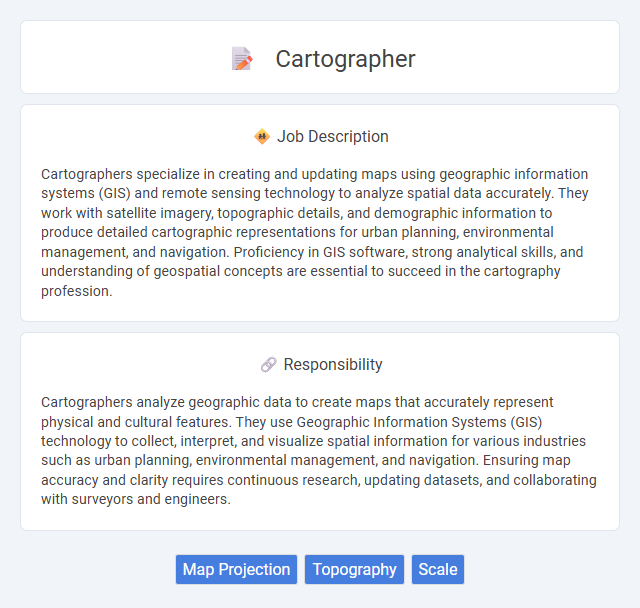
Cartographers specialize in creating and updating maps using geographic information systems (GIS) and remote sensing technology to analyze spatial data accurately. They work with satellite imagery, topographic details, and demographic information to produce detailed cartographic representations for urban planning, environmental management, and navigation. Proficiency in GIS software, strong analytical skills, and understanding of geospatial concepts are essential to succeed in the cartography profession.
Individuals with strong spatial awareness, attention to detail, and a passion for geography are likely to be well-suited for a cartographer job. People who enjoy working with maps, data analysis, and geographic information systems (GIS) may find this profession fulfilling. Those prone to discomfort with prolonged computer use or lacking patience for meticulous tasks might face challenges in this career.
Qualification
A Cartographer must possess strong skills in geographic information systems (GIS), spatial analysis, and advanced mapping software such as ArcGIS and QGIS. Proficiency in data visualization, remote sensing, and knowledge of geodesy principles are essential for creating accurate and detailed maps. A degree in geography, cartography, or related fields, combined with experience in digital cartography and programming languages like Python, enhances job performance.
Responsibility
Cartographers analyze geographic data to create maps that accurately represent physical and cultural features. They use Geographic Information Systems (GIS) technology to collect, interpret, and visualize spatial information for various industries such as urban planning, environmental management, and navigation. Ensuring map accuracy and clarity requires continuous research, updating datasets, and collaborating with surveyors and engineers.
Benefit
A career as a cartographer likely offers benefits such as the opportunity to work with cutting-edge geographic information system (GIS) technology and contribute to important spatial data projects. The role probably provides a satisfying blend of creativity and technical skill development, enhancing problem-solving abilities. Job stability and prospects for growth may be appealing due to increasing demand for geographic data in urban planning, environmental management, and various industries.
Challenge
Cartographer positions often present the challenge of interpreting complex geographic data accurately to create precise maps. There is a probability of encountering difficulties in integrating diverse data sources and updating maps in rapidly changing environments. Success in this role may depend on strong analytical skills and proficiency with advanced GIS technologies.
Career Advancement
Cartographer careers advance through gaining expertise in Geographic Information Systems (GIS), remote sensing, and spatial data analysis, which enhance job prospects in urban planning, environmental management, and defense sectors. Mastery of advanced mapping software and 3D modeling techniques opens opportunities for senior positions such as GIS analyst, project manager, or spatial data scientist. Professional certifications and continuous education in geospatial technologies significantly improve salary potential and leadership roles within government agencies and private industry.
Key Terms
Map Projection
Cartographers specialize in creating accurate and visually effective maps by applying advanced map projection techniques that transform the Earth's spherical surface onto flat maps. Expertise in selecting and optimizing projections such as Mercator, Lambert Conformal Conic, or Robinson ensures minimal distortion in area, shape, distance, and direction depending on the map's purpose. Mastery of geographic information systems (GIS) and spatial analysis further enhances the cartographer's ability to produce precise and contextually relevant cartographic representations.
Topography
Cartographers specializing in topography create detailed maps that represent the Earth's surface features, including elevation, terrain shapes, and landforms, using advanced geographic information systems (GIS) and remote sensing technology. Their work involves analyzing spatial data to produce accurate topographic maps that support urban planning, environmental management, and infrastructure development. Expertise in digital elevation models (DEMs) and contour mapping is essential for precise representation of physical landscapes.
Scale
Cartographers specialize in creating and interpreting maps with precise scale representations to ensure accurate spatial relationships. They utilize various scaling techniques, such as representative fraction and graphical scales, to depict real-world distances proportionally on different map types. Mastery of scale selection is crucial for cartographers to convey geographic information effectively across diverse applications, from urban planning to navigation systems.
 kuljobs.com
kuljobs.com